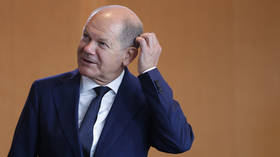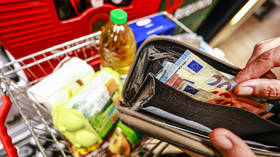German chancellor’s ratings hit new low

The approval rating of German Chancellor Olaf Scholz has reached the lowest mark since he took office in December. Only 25% of the public is satisfied with the job he’s doing, a survey published by Bild on Sunday reveals.
“It’s not working” for both Scholz and the ‘traffic light’ coalition government, the tabloid said as it shared the results of the poll, conducted by Germany’s INSA research institute.
A mere 25% of those surveyed approve of the chancellor’s job, with 62% expressing disapproval.
If an election were held right now, Scholz would only finish third with 18% of the vote.
Economy Minister Robert Habeck of the Green Party and Friedrich Merz, who heads the opposition Christian Democratic Union (CDU), are currently more popular, backed by 25% and 19% respectively, the poll shows.
The numbers for the ‘traffic light’ coalition, which unites the Social Democratic Party (SPD), the Free Democratic Party (FDP), and the Greens, were as bad as those for Scholz. Only 27% told the pollsters they were happy with the government, while 65% said they have a negative view of its decisions.
Scholz’s ratings have been on a steady decline since becoming chancellor eight months ago, Bild said. In March, when the conflict in Ukraine – in which Berlin sided with Kiev, supplying it with arms and slapping harsh sanctions on Moscow – had just started, he was backed by 46%, but in April, the number dropped to 38%.
Economic problems caused by the Covid-19 pandemic have been further exacerbated by the Western restrictions on Moscow and the subsequent decrease in Russian gas supplies to the EU.
Despite being Europe’s top economy, Germany has been hit hard by soaring gas prices as it faces the risk of energy shortages this winter. On Sunday, the head of the German central bank warned that “an inflation rate of even 10% is possible in the autumn months,” something which has not been seen in the country for more than 70 years.













